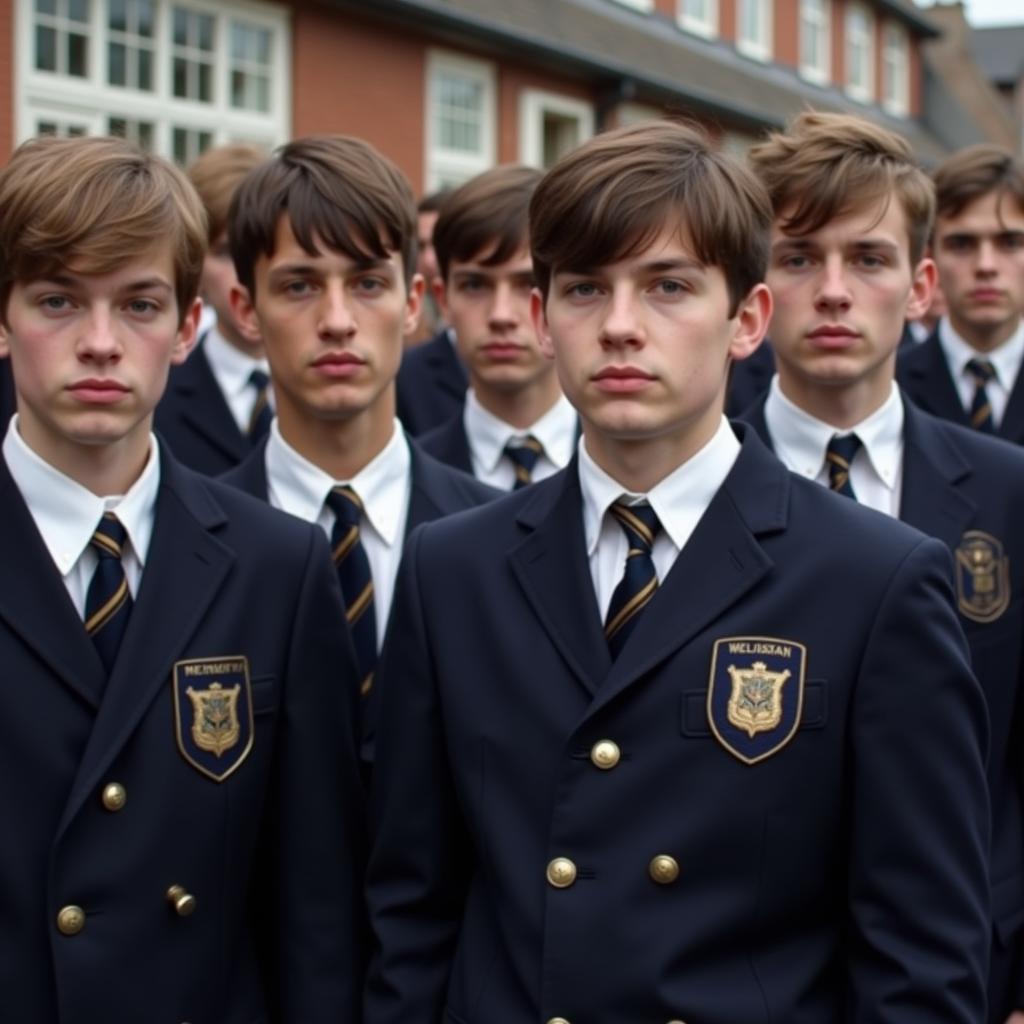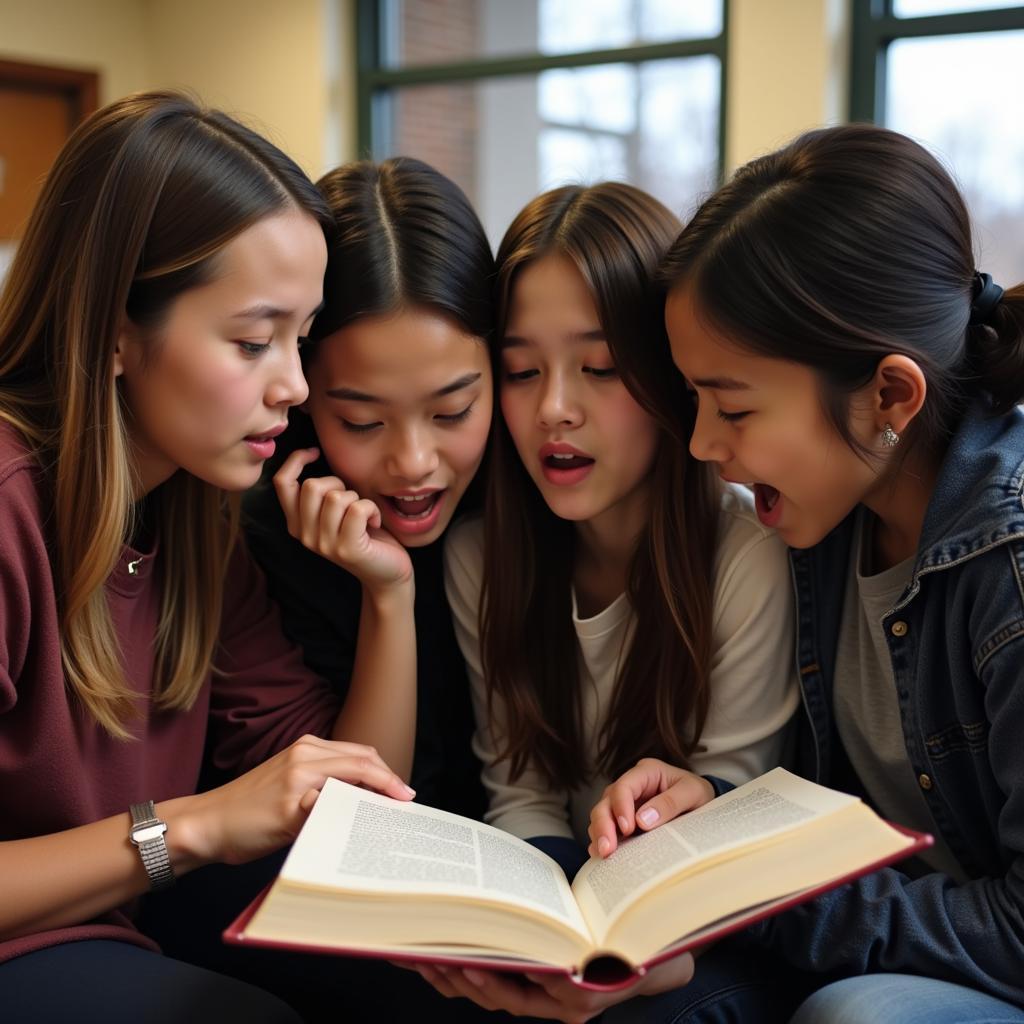The coming-of-age story “Dead Poets Society” (1989), set in a conservative all-boys prep school in 1959, tackles themes of conformity, tradition, and the pursuit of passion. While the film doesn’t explicitly depict a gay relationship, the exploration of these themes resonates deeply with the experiences of many LGBTQ+ individuals, particularly within restrictive environments. The film encourages viewers to question societal expectations and embrace their authentic selves, a message that holds significant weight for those grappling with their sexual orientation and identity.
Conformity vs. Individuality: A Struggle for Acceptance
 Students in uniform at Welton Academy
Students in uniform at Welton Academy
“Dead Poets Society” vividly portrays the struggle between conformity and individuality. Welton Academy, with its emphasis on tradition and “honor,” represents a society that prioritizes fitting in over self-expression. This pressure to conform resonates with the experiences of many LGBTQ+ individuals, particularly during the film’s historical context when societal acceptance of diverse sexual orientations was limited.
The film’s protagonist, John Keating, challenges this conformity, encouraging his students to “carpe diem” – seize the day – and pursue their passions. This message of embracing individuality holds particular significance for LGBTQ+ individuals who often face pressure to conform to heteronormative expectations.
Finding Your Voice: The Power of Poetry and Self-Expression
 Students reading poetry together
Students reading poetry together
Poetry becomes a powerful tool for self-expression in “Dead Poets Society.” Keating inspires his students to look beyond the literal and explore the world through different lenses. For LGBTQ+ individuals, particularly during a time when openly expressing their identities could be met with hostility, finding outlets for self-expression becomes crucial. Poetry, with its ability to convey emotions and experiences through metaphor and imagery, can provide a safe space for exploration and self-discovery.
The Weight of Expectations: Navigating Societal Norms
 A student standing alone, looking contemplative
A student standing alone, looking contemplative
The film highlights the emotional toll of societal expectations, particularly for young people trying to find their place in the world. Neil Perry’s tragic story underscores the devastating consequences of suppressing one’s true self to meet the demands of others. This struggle resonates deeply with the experiences of many LGBTQ+ individuals who have faced pressure to conform to societal norms, often at the expense of their own well-being.
“Dead Poets Society” and its Enduring Legacy
While not explicitly about being gay, “Dead Poets Society” offers valuable insights into themes of identity, acceptance, and the courage to be oneself. The film’s exploration of these universal human experiences transcends time and resonates with audiences across generations, including those who identify as LGBTQ+.
FAQ
1. Why is “Dead Poets Society” considered a significant film for the LGBTQ+ community?
While not explicitly depicting gay characters, the film’s exploration of themes like conformity, self-expression, and challenging societal expectations resonate deeply with the experiences of many LGBTQ+ individuals.
2. How does the film address the idea of finding your voice?
“Dead Poets Society” emphasizes the importance of self-expression, using poetry as a powerful tool for exploring identity and challenging norms.
3. What can viewers learn from the film’s depiction of societal expectations?
The film highlights the potential consequences of suppressing one’s true self to conform to societal pressures, urging viewers to embrace their individuality.
4. Does “Dead Poets Society” offer a message of hope?
Despite its tragic elements, the film ultimately encourages viewers to embrace their passions, challenge conformity, and live authentically.
5. How does the film’s historical context contribute to its LGBTQ+ themes?
Set in a time when societal acceptance of diverse sexual orientations was limited, the film’s themes of individuality and challenging norms hold particular significance for LGBTQ+ viewers.
Need Support?
For resources and support on issues related to LGBTQ+ identity, acceptance, and well-being, please contact:
Phone Number: 02043854663
Email: [email protected]
Address: Khu 34, Bắc Giang, 260000, Việt Nam.
Our team is available 24/7 to provide confidential support and guidance.
You are not alone.